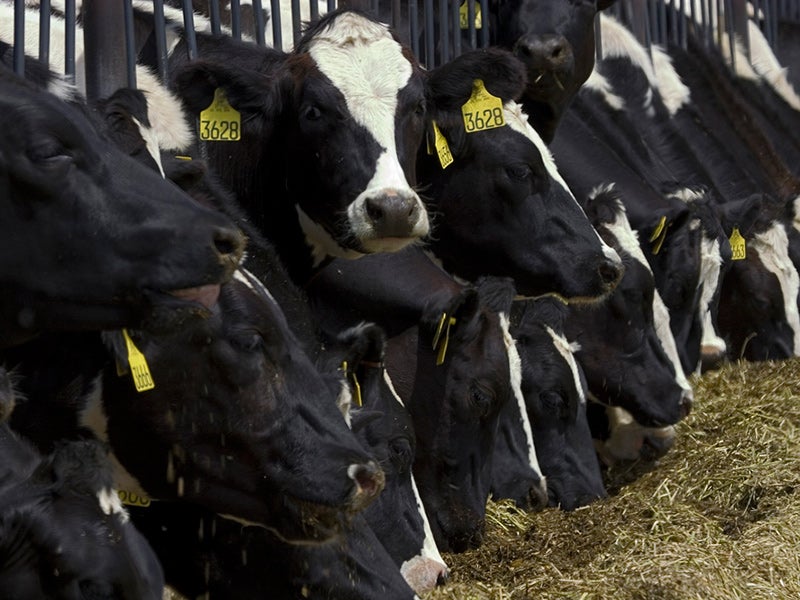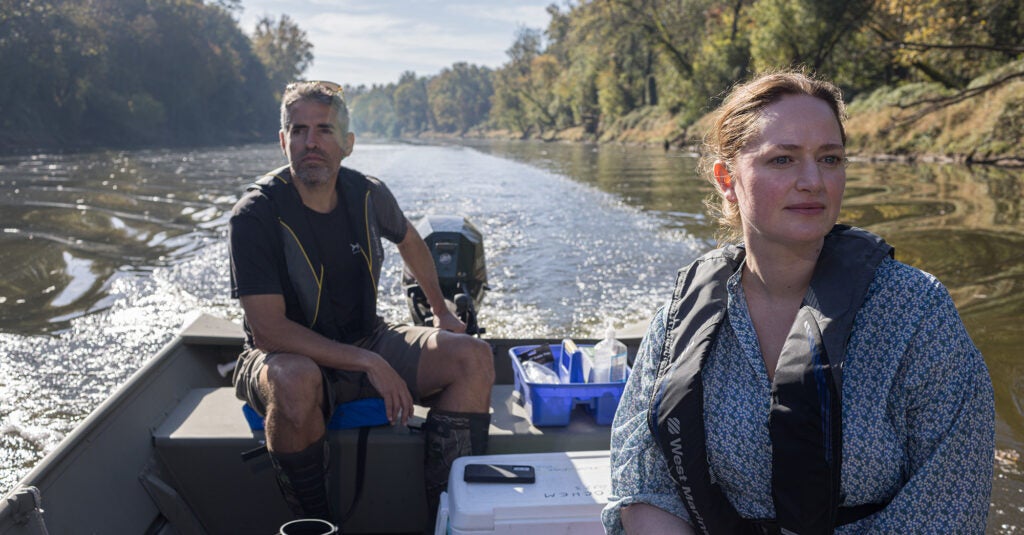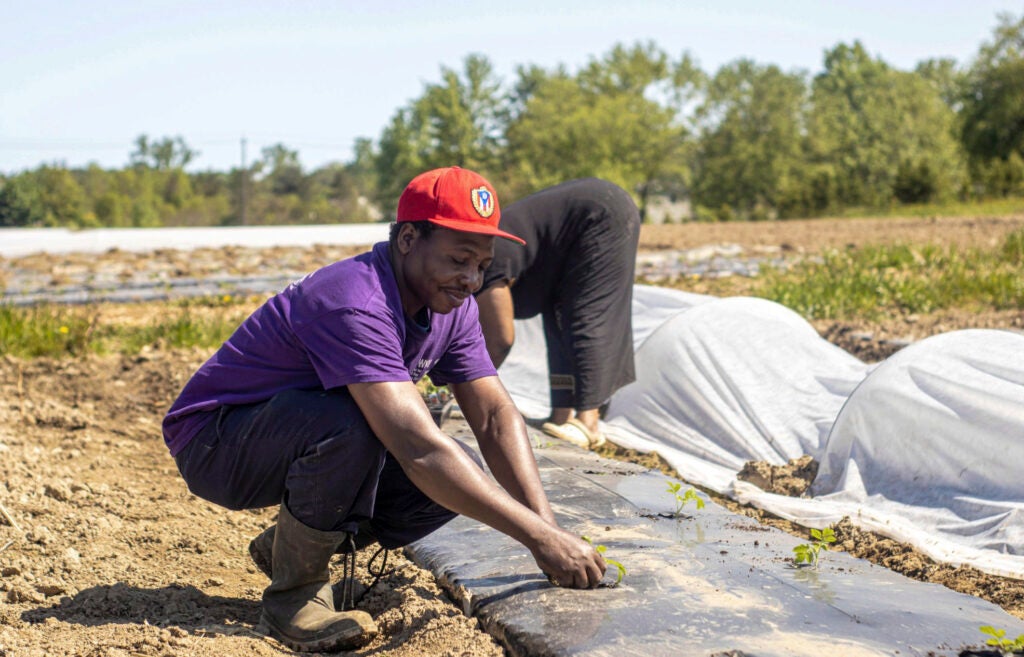Media Inquiries
Nydia Gutiérrez
Public Affairs and Communications Strategist
ngutierrez@earthjustice.org
Legal Assistance Inquiries
Contacto de Prensa
Robert Valencia
Estratega de Comunicaciones y Asuntos Públicos Hispanos/Latinos
rvalencia@earthjustice.org
Follow us
Earthjustice’s Sustainable Food and Farming Program aims to make our nation’s food system safer and more climate-friendly.
Our Impact
Our Nation’s Food System is a Top Polluter
Our current food system threatens our health by polluting the air and water and exposing workers, neighbors, and consumers to dangerous chemicals. Our food system also imperils native wildlife and poisons our climate, releasing about one-third of the nation’s total greenhouse gas emissions. Common practices, such as overfertilizing single-crop fields, confining animals for the industrial-scale production of meat and dairy, and over-relying on pesticides and antibiotics, put everyone at risk. In addition, even though our current system produces a lot of food, many people still lack easy access to fresh, nutritious food.
Many Farmers Have Begun to Implement Safer, Climate-friendly Practices
The good news is that many farmers know how to produce food without contributing to unnecessary air and water pollution, or putting human health at risk. From growing perennial plants, rotating crops, and planting cover crops to improving the management of animals and manure, farmers have shown they can produce nourishing food without abusing our environment. In fact, many of these practices not only reduce greenhouse gas emissions but also increase farms’ resilience to the extreme weather events that result from climate change.
Building a Climate-friendly Food System
We must build a food system that supports responsible farmers and accelerates the adoption of climate friendly practices by strengthening requirements that control agricultural pollution, increasing incentives for safe, climate-friendly farming, opposing consolidation within the agricultural sector, and ensuring that resources are equitably distributed among all farmers.
Laws and Regulations Must Be Revised to Support Sustainable Agriculture
Currently, taxpayers spend billions of dollars annually to subsidize crops used for wasteful animal feed, industrial animal factories, climate-harming biofuel, and unhealthy food and drinks, and our environmental laws too often give a free pass to industrial agriculture. Fortunately, after years of advocacy, there is now growing interest among farmers and decisionmakers to reform the laws, regulations, and policies that govern agriculture.
Expanding Research, Support, and Incentives
Together with our partners, we are pressing for the expansion of research, support, and incentives that will help all farmers adopt safer, climate-friendly practices and level the playing field, so that farmers who chose to operate responsibly are no longer at a financial disadvantage.
We’re Taking on Big Ag & Big Food
Earthjustice has built a track record of success at cleaning up dirty industries through focused and persistent legal advocacy. We’re using these same strategies to reform our nation’s food and farming system. We work in partnership with activists, frontline communities, sustainable farmers and ranchers, scientists and others to help accelerate this shift to a safer, more climate-friendly food system.
Highlights of Our Work:
- We sued the Environmental Protection Agency (EPA) to impose tougher standards to control water pollution from slaughterhouses.
- We challenged a component of EPA’s renewable fuel standard that allows the conversion of native grasslands, which harms wildlife and pollutes our climate.
- We sued to stop a tar sands oil pipeline that will contribute to climate change and threaten wild rice, a nutritionally and culturally important food for many tribal citizens living in northern Minnesota.
- We fought for and obtained nationwide protections for farmworkers exposed to pesticides and are now fighting to keep them in place and ensure they are well implemented.
- We are challenging EPA’s rule exempting concentrated animal feeding operations from reporting their toxic air emissions under the Emergency Planning and Community Right to Know Act.
- We are working with allies on legislative and administrative efforts at the federal and state levels to reduce emissions of greenhouse gases such as methane from concentrated animal feeding operations and nitrous oxides from excess fertilizers — and ensure that the communities surrounding these operations have a voice in the decisionmaking process.
- We filed a federal civil rights complaint on behalf of communities disproportionately harmed by industrial animal agriculture in North Carolina. After settling that complaint, we are continuing to partner with communities to ensure that they have a voice in decisions about industrial animal operations that threaten their health.
- With allies, we stopped the Trump administration’s weakening of school lunch nutrition standards and successfully sued to ensure that consumers receive the nutrition information they need to make informed dietary decisions without delay, and are now advocating for governments to use their purchasing power to advance healthy and sustainable foods.
- We sued the Trump administration because it ignored the science and the recommendation of its own staff in choosing not to ban chlorpyrifos, a widely used toxic pesticide derived from WWII nerve agents, and have helped pressure California, New York, and other states to take action in the face of federal inaction. And, among his first actions as president, President Biden issued an executive order to protect people from “exposure to dangerous chemicals and pesticides” and promised to re-assess chlorpyrifos and potentially reinstate an Obama administration recommendation to ban them.
- We petitioned New York City agencies to increase protections for community gardens.
- We’re challenging a major loophole in food safety oversight that allows manufacturers to decide — in secret — whether a new or untested chemical is “safe” enough to be added to our food.



